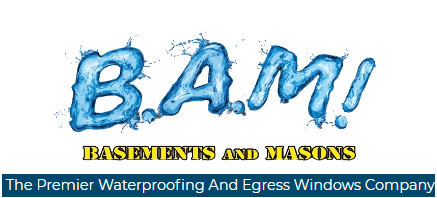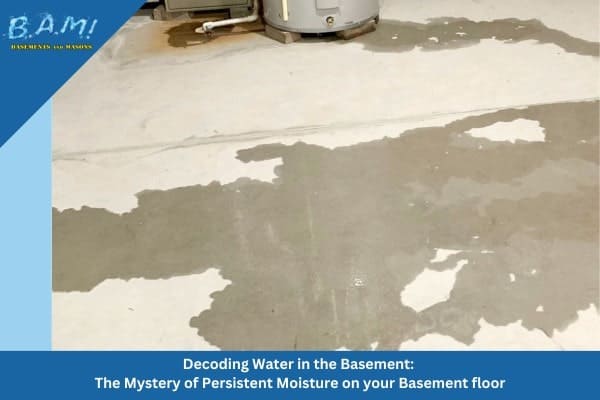Decoding Water in the Basement: The Mystery of Persistent Moisture on your Basement floor
One unmistakable indicator of basement water troubles is stepping into a puddle of water on your basement floor. Water can enter your basement for various reasons, whether due to hydrostatic or lateral pressure, overflowing gutters, or oversaturated soil surrounding the foundation. Regardless of its origin, through cracks, deteriorating mortar joints, or the elusive cove joint, water inevitably finds its way onto your basement floor.
Know how the foundation of your home is built
To effectively combat these basement water problems, homeowners should first know what to look for. When constructing a foundation, the initial step, following excavation, involves pouring broad concrete slabs called footings. These footings outline the foundation’s perimeter and help distribute the structure’s weight. Once the footings cure, foundation walls are built, either by pouring concrete into molds or by assembling concrete blocks with mortar.
After the structural foundation is in place, the soil within is leveled to align with the footing tops. A vapor barrier is then laid over the soil, and the basement floor is poured. Typically, the concrete composing the basement floor is only two to three inches thick and serves no structural purpose; its sole function is to provide a clean, level surface within the basement. This floor essentially rests atop the footings and butts against the walls. The most notorious entry point for water entering into the basement is the cove joint.
Avoiding Ineffectual Solutions for a Damp Basement Floor
Another common culprit for water in the basement is non-structural cracks in poured concrete basement walls. These cracks are best remedied by injecting them with expanding polyurethane, but some homeowners mistakenly apply the “fix one crack, fix them all” approach and request floor cracks to be similarly treated. This approach, however, is ineffective.
Injecting expanding polyurethane into a floor crack may seal that particular crack, but it fails to address the underlying hydrostatic pressure, which may either cause additional floor cracks or exacerbate cove seepage. The same principle applies to patching the cove joint with hydraulic cement or similar materials. Even if such patching were successful (which is challenging given the nature of the cove joint), it would not alleviate the hydrostatic pressure, and groundwater would simply seek alternative routes into the basement.
Using the DIY favorite, caulk, will not resolve these problems either, as it does not adhere to floor cracks or the cove joint. Attempting to use it will only result in a sticky mess and a waste of time that could have been better spent on proper repairs.
Preventing Basement Floor Moisture: The Ultimate Fix
The sole method to prevent water on the basement floor from seeping through is to install an interior drain tile system designed to collect rising moisture.
Interior Drain Tile System: This system is positioned beneath your basement floor along the foundation walls. It consists of a perforated pipe set in a bed of washed stone, which collects and redirects ascending groundwater to a sump pit.
Vapor Barrier: A thin polyethylene sheet wraps around your foundation walls to prevent moisture from permeating them, channeling any water into the drain tile system below.
Sump Pump: Placed inside a sump pit, the sump pump removes the water deposited into the pit by the drain tile system, utilizing a discharge line that directs water at least 20 feet away from your home, averting further water seepage.
Seeking Professional Basement Repair Assistance
When a homeowner encounters a damp basement floor, cove seepage or floor cracks are often the problem. Identifying the source of the water in the basement requires the expertise of a professional, and homeowners should rely on a skilled basement waterproofing contractor for effective and enduring solutions. Entrust the experts at BAM Basements and Masons, a trusted name in basement waterproofing in and around Des Moines, to assist you. Our team has years of experience and extensive knowledge about maintaining a moisture-free and humidity-controlled basement environment. Consequently, we can recommend the most reliable solution for you and your home.
All our basement waterproofing solutions are affordably priced, and we guarantee timely project completion. To learn more about basement waterproofing and receive a complimentary estimate, do not hesitate to contact us today!


